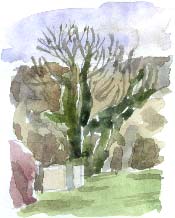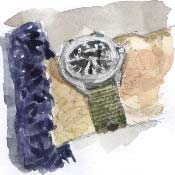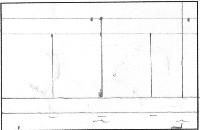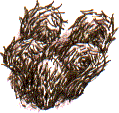
|
Darkling ThrushWednesday, 29th January 2003, West Yorkshire |
![]()
![]()
![]()
![]() Rocks |
History |
Workshop |
Links |
Home Page
Rocks |
History |
Workshop |
Links |
Home Page
![]()
 The
day is drawing to an end as I finally sit down and squeeze in a few minutes
painting this view from my studio window of the ivy-covered ash at the
edge of the wood. It was actually darker and dimmer than this but my page
was dark and dim too so consequently I've painted it lighter than it actually
was.
The
day is drawing to an end as I finally sit down and squeeze in a few minutes
painting this view from my studio window of the ivy-covered ash at the
edge of the wood. It was actually darker and dimmer than this but my page
was dark and dim too so consequently I've painted it lighter than it actually
was.
 Soon it's too dark to continue painting. Down by the pond I see a bird
in silhouette. With binoculars I can make out its speckled breast; it's
the song thrush which, I'm glad to say, has been a regular
in our garden for a few days now.
Soon it's too dark to continue painting. Down by the pond I see a bird
in silhouette. With binoculars I can make out its speckled breast; it's
the song thrush which, I'm glad to say, has been a regular
in our garden for a few days now.
One Straight Squirrel
![]()

![]()
This morning, as I was driving up Benton Hill into Horbury a squirrel ran out from the leafy grounds of the retirement home, crossed the road, pausing for a moment near the middle, crossed the pavement and shot straight up a sandstone retaining wall. It's as if it had a global positioning system and it was following a dead straight course, regardless of traffic and our petty territorial boundaries.
Timepiece
 I've
been exploring time and memory in my writing and drawing for a couple
of months now so it's appropriate that the practical measurement of time
is now giving me problems that are literally affecting me physically!
I've
been exploring time and memory in my writing and drawing for a couple
of months now so it's appropriate that the practical measurement of time
is now giving me problems that are literally affecting me physically!
My wristwatch, a cheap one which I bought some years ago, has been irritating me, so much so that I've been scratching the dry rash that's flared up over the pulse on my wrist and drawing blood. It's probably the tarnished brassy buckle or a chemical in the leather or perhaps I got the strap wet while working out in the rain. Since this started happening a few weeks ago I've been thinking that I should try buying a new strap. Now the battery has run down too.
As the cheapest new watches now cost less than the price of fitting a new battery and strap I'm afraid, although it goes against my ecological principles and against my proverbial meanness as a Yorkshireman, it's time to chuck out the old watch and buy a new one.
As booklet sales have been going well I decide I'll choose the one I like, regardless of the price. Also I fancy a change from the classic white-faced watches I've always worn. So, white numerals on black, that's radical! - but, seriously the attraction of this watch, apart from what I see as its good looks (no, I'll never be a style guru!), is the webbing 'military-style' strap and the stainless steel watch and buckle. They are most unlikely to irritate me.
But I also like the idea that it will never need a battery; an unbalanced flywheel powers it, apparently running a tiny generator or dynamo, since this is a quartz watch. If I'd just been really active and it was now fully powered up by all that kinetic energy I could sit here, motionless at my computer for six months before it ran down! Isn't that useful?
Also, and you'll be impressed by this, it is water resistant to 100 metres. Unfortunately, of course, I'm not.
Note: 10 years later this watch, a Lorus Sports Kinetic, is still going strong. Just think how much I must have saved on batteries! Enough to buy a new watch strap, which it's probably due for by now. 28/11/12
The Music of Time
![]()
![]()
![]()
![]()
What are days for? In the western world (and in most of the east, come to think of it) we're obsessed with time and cramming the most into our seconds, minutes and hours.
For various reasons I've become fascinated by what might be called minimalist music recently. Like the pulse of days, hours or monthly lunar cycles, minimalist music, at first hearing, often appears to be little more than a series of repeated units. It can be hypnotically fascinating or repetitively annoying depending on what mood you're in!
If you are in the right mood and feeling calm enough to actually listen a little more closely you'll discover that there's a rich variation going on within those simple elements. There's nothing new in this of course, after all, that variation on a simple phrase is very much what Bach did.
![]()
![]()
![]()
![]()
 It
reminds me of watching a fence go by as you sit on the bus. Each section
of fence repeats again and again but, if it's a rickety, repaired fence,
there's that bit of individual character and variation in each section.
As the fence goes by you might find yourself taken into its rhythm, getting
into a state of relaxed concentration - the state that I try to get into
when I'm drawing - then you might begin to realise that there's a bigger
picture, a deeper pattern emerging; yes - it's those telegraph poles that
are stepping in in the background, synchronised to the rhythm of the fence.
It
reminds me of watching a fence go by as you sit on the bus. Each section
of fence repeats again and again but, if it's a rickety, repaired fence,
there's that bit of individual character and variation in each section.
As the fence goes by you might find yourself taken into its rhythm, getting
into a state of relaxed concentration - the state that I try to get into
when I'm drawing - then you might begin to realise that there's a bigger
picture, a deeper pattern emerging; yes - it's those telegraph poles that
are stepping in in the background, synchronised to the rhythm of the fence.
I used this effect, of elements going by at different but synchronised cadences, when I designed a simplified jungle as the background to an animated GIF (above, left) which I drew recently of a jaguar. I like the way such simple elements as vertical pencil lines (they became palm trees in the final version) can give a sense of space and speed. The jaguar walked along in the foreground of the 'jungle'.
Prospero's Books
There's a piece by Michael Nyman, Prospero's Magic, from his music to the Peter Greenaway film Prospero's Books which has this effect. It starts with the main theme, going along at about the walking pace, as if you were walking on your own and getting into the rhythm of walking, then you become aware that there's something else there; it's as if you become aware that you're not alone - that someone, or something, is there walking along beside you. Maybe it has always been there and you never noticed.
In this case it's not a row of telegraph poles, its a majestic theme which comes in in the background; to me it represents the magical protection that accompanies Prospero and Miranda as they walk about their island in The Tempest and it hints at the magic that's with us every day, unnoticed; the spirit that underlies our mundane experience of the everyday world. To the outside world Prospero, a character that Shakespeare is said to have based on the Elizabethan philosopher and alchemist John Dee, is a magician dabbling in black arts, someone to be fearful of, but the music suggests the depth of wisdom, insight and learning that informs his magic.
The Infinite Variety
 There's
something appealing to me in the idea that you can express emotions, deeper
feelings, through the use of the most everyday elements. When I'm drawing
the leaves on a branch, or the other day when I was drawing a circle of
rocks arranged around the ashes of a campfire, I become aware of the endless
variation in the simple, repeated motifs in the natural world. I feel
that there's some deeper meaning in the simplest elements of our lives.
In fact, for me, there's more real meaning in the simpler things, the
small things, than there is in our over-the-top moments.
There's
something appealing to me in the idea that you can express emotions, deeper
feelings, through the use of the most everyday elements. When I'm drawing
the leaves on a branch, or the other day when I was drawing a circle of
rocks arranged around the ashes of a campfire, I become aware of the endless
variation in the simple, repeated motifs in the natural world. I feel
that there's some deeper meaning in the simplest elements of our lives.
In fact, for me, there's more real meaning in the simpler things, the
small things, than there is in our over-the-top moments.
Too much Form?
This is probably why I'm finding minimalism in music so refreshing. I'm a bit of a romantic myself and I find that the overblown romanticism in some of our best-loved music is too much for me these days.
 To
picture it in ridiculously simple terms; compared with the rickety fence
and telegraph poles that I equate with minimalist music, I see the form
of some romantic music as rather like my sketched diagram;
To
picture it in ridiculously simple terms; compared with the rickety fence
and telegraph poles that I equate with minimalist music, I see the form
of some romantic music as rather like my sketched diagram;
- It might start with a clear gateway into the piece to set the scene,
as if you're being invited to step in through the wrought iron gates
and along a tree-lined avenue. There's such a recognised pattern to
channel the emotions that it might almost feel as if you're being exploited
by the composer and performer (although, if you're a romantic music
fan, you're going to be a very willing victim).
- Then there's the central section, often supercharged with emotion.
As an Englishman I've got a natural reserve so I've got problems with
Germanic Sturm und Drang (or, for that matter, with the screaming
agony of Flamenco - hey, we don't do things that way in England!).
- Finally there might be a little recapitulation, with a bit a twist to it to bring about a resolution, so we might be back briefly at the tree-lined drive and gates, but, and this really annoys me, there might also be a showy sustained note, or some kind of musical fireworks or flourish, that will bring the house down in rapturous applause at the end of the piece.
Have we really experienced true, deep emotion - the sort we naturally experience in our everyday lives - or have we been led along a hackneyed supercharged emotional roller-coaster?!
Glassworks

While I'm in town to buy my watch I take the opportunity to check out the record store. I don't hold out much hope because they're not specialists in 'classical' music and the racks are filled mainly with pop and rock.
While driving through the rush hour traffic a few weeks ago, listening to Radio 3 on the car stereo, I'd heard a piece from Naqoyqatsi, music by Philip Glass for the film by Godfrey Reggio. It was so fresh and intriguing, I'd almost say it made the hair stand up on the back of my neck. Browsing in the store I'm so surprised; there's the album amongst the small selection of so-called 'serious music'.
I think I've heard Philip Glass's music described as minimalist, but that might give the impression that it's sparse, ascetic and cold. It isn't! - the piece they played, Primacy of Number, is so inviting, there's a witty lilt about it. There's an evident excitement and enjoyment in the way it's played by members of the Philip Glass Ensemble. Somehow with our western romantic tradition there can be a kind of slushiness about music that's intended to tap into our deeper emotions. Well this piece certainly takes you along with it emotionally but it's got some of the clarity, and complexity, that I associate with those mathematically based Islamic tile designs. That makes it sound very serious and structural but it's also got a feeling of playful improvisation about it in the nuances that are given to the repeated phrases.
Glass says that Yo-Yo Ma's cello solos emerge as the 'voice' of the music, and Reggio says; 'His utterance reaches to that space between words, to the spirit, where feelings can touch the soul.'
Well that's beginning to sound a bit over-the-top romantic in itself, and it shows the difficulty of describing music in words, but it reminds me of a proverb that I'd love to think was my creed, and which seems to me to sum up what drawing the natural world is all about;
Tao is beyond words . . . and beyond things
. . . it is not expressed . . . either in word or in silence.
. . . Where there is no longer word or silence
. . . Tao is appreciated.
Chuang Tzu
According the to Shorter Oxford English Dictionary tao is;
the or the absolute being or principle underlying the universe; ultimate reality.
The way, method, or norm to be followed, esp. in conduct.
While in the record store I also bought the Philip Glass album Glassworks,
which includes a piece called Island. How could I resist that?
![]()
![]() Next page | Previous
page | This
day in 2000 | This month |
Nature Diary |
Home
Page
Next page | Previous
page | This
day in 2000 | This month |
Nature Diary |
Home
Page
![]()